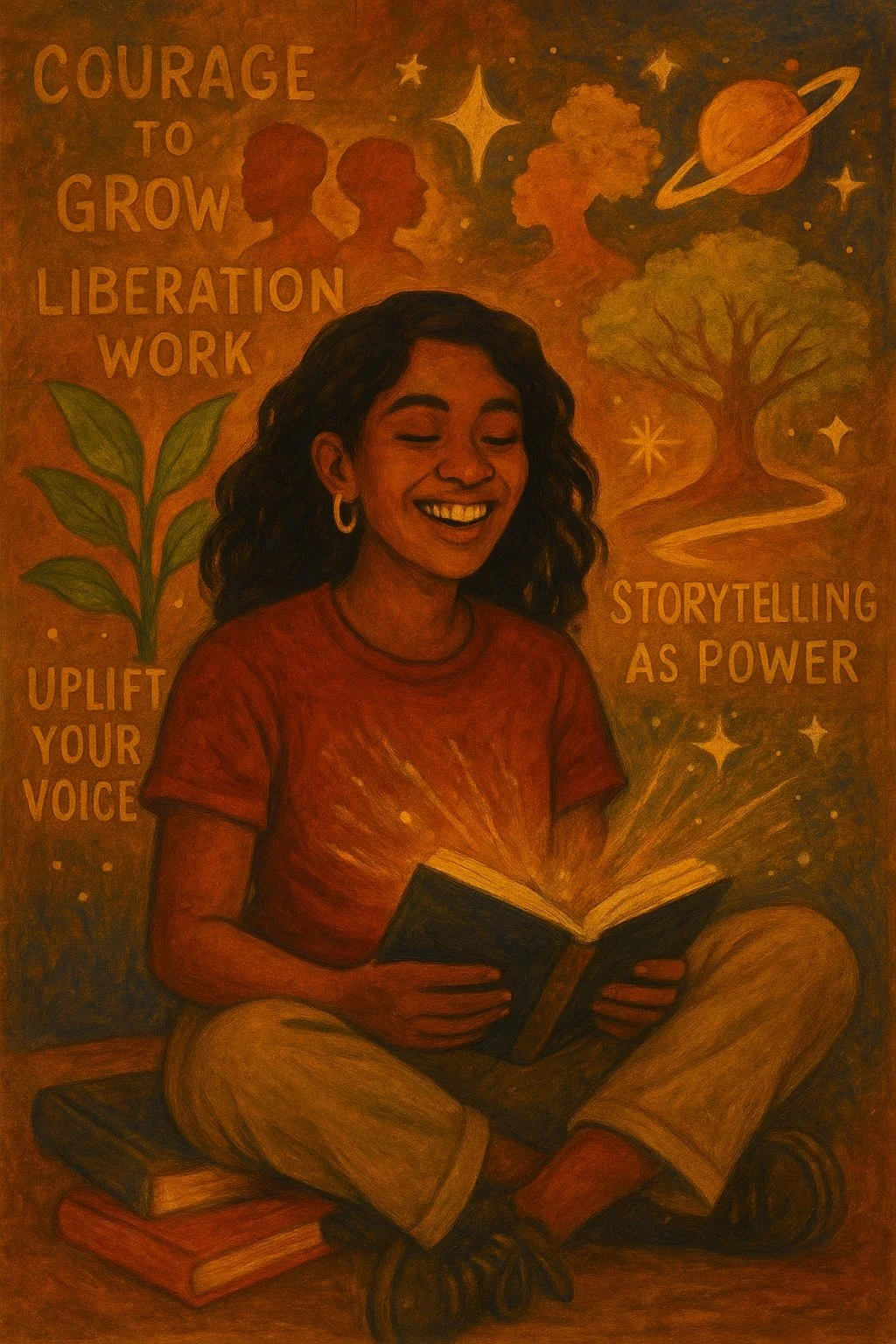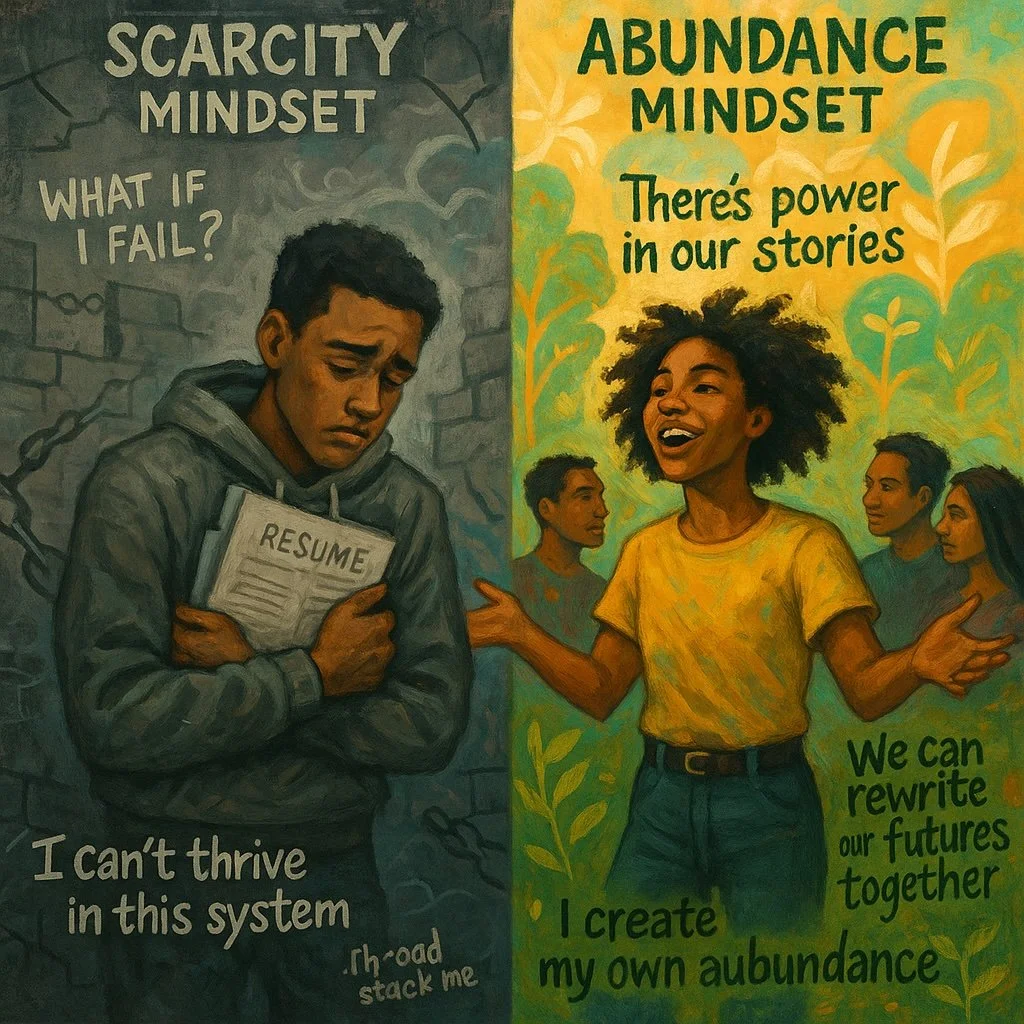Abundance Isn’t a Buzzword - It’s a Mindset Shift - Part 1
Reclaiming the Word
Abundance.
What do you think of when you hear the word abundance? What do you imagine?
Personally, I believe abundance is a word that needs to be fully reclaimed—and many have already started doing that work. I’m not sure exactly when it happened, but at some point in America, the meaning of abundance shifted. It’s still a highly valued concept, but today’s version has less to do with health, prosperity, or growth. Now, abundance is often equated with money, power, and surplus.
Everyone’s search algorithms are different, but if you Google the word abundance, like I did, here’s some of what comes up:
AI Overview: Abundance, in general terms, refers to a great quantity or plentifulness of something, exceeding what is normal or necessary. It can also describe the state of having more than enough, both in terms of resources and in a broader sense of having what you need or want in life. In a spiritual context, abundance can be associated with a positive mindset and the belief that there is always enough for everyone.
Oxford Dictionary:
Abundance /əˈbənd(ə)ns/ — noun
A very large quantity of something.
(in solo whist) A bid by which a player undertakes to make nine or more tricks.
There are more definitions like these scattered across the summaries and search results, and honestly, they reflect what most people tend to think when they hear the word: more stuff. But let’s be clear—abundance isn’t about luxury, excess, or hustle culture. It’s not about pretending everything is fine or pushing toxic positivity. And it’s definitely not about ignoring the reality of struggle or scarcity, especially for those of us who’ve lived it up close.
Abundance doesn’t mean you’ve had it easy—it means you still believe something better is possible. It’s a mindset that honors your truth while making space for hope, growth, and healing. It says: even in the face of limits, I can imagine more. I can choose purpose, joy, and alignment—even if I have to build it from scratch.
What Is Abundance?
This reimagined definition is what so many of us are reclaiming—an abundant mindset that’s rooted in truth, not trend. And we’re not alone. The people quoted below are naming and living this deeper version of abundance—one that reflects inner worth, intention, and possibility.
“True abundance isn’t based on our net worth, it’s based on our self-worth.”
— Gabrielle Bernstein
“An abundance mentality springs from internal security, not from external rankings, comparisons, opinion, possessions, or associations.”
— Stephen Covey
“Abundance comes from within. It comes from thought, intention, attention, and expectation.”
— Deepak Chopra
“Abundance is not something we acquire. It is something we tune into.”
— Wayne Dyer
“My mission in life is not merely to survive, but to thrive; and to do so with some passion, some compassion, some humor, and some style.”
— Maya Angelou
“Don’t let anybody, anybody convince you this is the way the world is and therefore must be. It must be the way it ought to be.”
— Toni Morrison, The Source of Self-Regard
Abundance is the belief that your story holds enough—enough power, enough truth, enough possibility—to shape the life you deserve.
It’s not about having more of what the world says is important. It’s about knowing you are more—and having more of what feels abundant to you in your soul.
We define abundance as a mindset rooted in self-worth, purpose, and the courage to grow beyond what the world expected. It’s the shift from surviving to thriving, from fear to freedom, from limitation to freedom dreaming.
That’s why abundance isn’t something you earn, chase, or measure in likes, letters behind your name, or numbers in your bank account. It’s something you remember. Something you reclaim.
Abundance is already within you—it shows up when you trust your voice, take up space, rest without guilt, and root your decisions in what actually matters to you.
This isn’t just mindset work—it’s liberation work. It’s redefining success on your terms and giving yourself permission to thrive.
The Mindset Shift: Scarcity vs. Abundance Thinking
Hopefully you noticed—we didn’t just define abundance; we defined an abundance mindset. And that’s an important distinction.
The way we think affects how we move through the world. Our current mindset is often hard to recognize, and even harder to shift. Stephen Covey, author of The 7 Habits of Highly Effective People, once said:
“Most people are deeply scripted in what [he calls] the Scarcity Mentality. They see life as having only so much, as though there were only one pie out there. And if someone were to get a big piece of the pie it would mean less for everybody else… Instead, [he has] an Abundance Mentality: when people are genuinely happy at the successes of others, the pie gets larger.”
Now, before we go any further—it’s important to name that Covey is a straight white man, and the metaphor has its limits. Many people of color—and most immigrants to America—know that the American Dream, and the pie Covey talks about, was never made for us. Access to that pie has always been policed, limited, or outright denied.
And while his point about mindset holds some truth, it often leaves out the deeper systemic realities we navigate daily.
The scarcity mindset isn’t just personal—it’s political. It’s been taught, reinforced, and embedded in us by systems like racism, capitalism, classism, ableism, and colonization. We’re conditioned to believe there’s not enough to go around—resources, opportunities, safety, rest, even joy—especially if you’re not white, wealthy, or well-connected.
These systems thrive when we compete instead of collaborate, when we doubt our worth, and when we internalize the lie that someone else’s success means there’s less for us.
Shifting into an abundance mindset isn’t just about thinking differently—it’s about unlearning survival scripts and reclaiming your right to imagine something more.
Like Brené Brown says, “The opposite of scarcity is not abundance. It is enough.”
What Is a Scarcity Mindset?
A scarcity mindset is that quiet (or loud) voice that tells you there’s never enough—and that you’re never enough either. It’s the belief that resources are limited, success is exclusive, and opportunities are a one-shot deal.
It sounds like:
“If they win, I lose.”
“There’s no room for me.”
“I need to hold on tight to what I have because it could disappear at any moment.”
It shows up as comparison on social media. Hesitating to share your dreams because you’re afraid someone will beat you to it. Staying in a job you’ve outgrown because you don’t believe there’s anything better out there. It can look like burnout disguised as ambition, or self-doubt dressed up as perfectionism.
This mindset doesn’t come from nowhere. It’s shaped by systems—racism, capitalism, patriarchy—that have taught many of us to survive, not to thrive. When you’ve been told (directly or indirectly) that there’s only one seat at the table—or that the table was never meant for you—it makes sense to internalize lack.
But just because we learned it doesn’t mean we have to live by it. Scarcity thinking keeps us small, isolated, and exhausted. Recognizing it is the first step. Naming it gives us power. And shifting it? That’s where freedom begins.
What Is an Abundance Mindset?
An abundance mindset flips the script. It’s not about pretending life is perfect—it’s about believing something better is possible. It’s the quiet confidence that there’s enough time, healing, success, love, and joy for you and your people too.
Abundance says:
“There’s more than one path to get where I’m going.”
“Their success doesn’t take away from mine.”
“I can give and receive without fear of running out.”
It looks like choosing rest without guilt. Celebrating your friend’s win while still holding space for your own process. Applying for that opportunity—even if you’re scared—because your worth doesn’t depend on a single outcome. Sharing resources freely because you know what you give can grow.
Let’s be real: this mindset isn’t easy. It goes against everything we’ve been taught. But it’s powerful. It’s liberatory. And it’s deeply personal.
Abundance isn’t about ignoring struggle—it’s about not letting struggle be the whole story. It’s about imagining more, building more, and believing that you already carry enough within you to begin again—and again—and again.
Edited with support from ChatGPT (OpenAI) to enhance clarity and flow, while staying true to the story’s voice.
All images in this post were generated using OpenAI’s DALL·E image model via ChatGPT.


